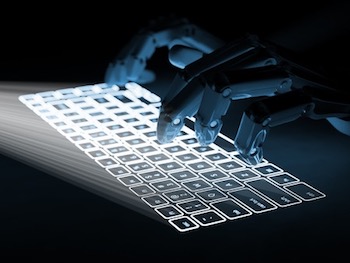“Experimentation is the least arrogant method of gaining knowledge. The experimenter humbly asks a question of nature.” ~ Isaac Asimov
 Artificial Intelligence (AI) is coming for your job. But is it coming for the job of your photographer or inventor? The driver-less cars, automated factories, and automated laboratories of today may give way to AI capable of thinking, writing, creating or even diagnosing disease. So it certainly seems feasible that AI is coming for the jobs of creators like photographers and inventors, although we may be many years away from true “general AI” capable of human-like intelligence. Nevertheless, automation is taking over many tasks once relegated to humans — like running laboratory experiments or being a lawyer.
Artificial Intelligence (AI) is coming for your job. But is it coming for the job of your photographer or inventor? The driver-less cars, automated factories, and automated laboratories of today may give way to AI capable of thinking, writing, creating or even diagnosing disease. So it certainly seems feasible that AI is coming for the jobs of creators like photographers and inventors, although we may be many years away from true “general AI” capable of human-like intelligence. Nevertheless, automation is taking over many tasks once relegated to humans — like running laboratory experiments or being a lawyer.
The term “narrow” or “weak” AI, refers to AI capable of performing “specific ‘intelligent’ behaviors in specific contexts,” while “strong” or “general” AI refers to “hardware or software emulating human-like general intelligence.”
Intellectual property law focuses on creators and inventors — people who create and invent. For example, the U.S. Constitution refers to securing exclusive rights to “authors and inventors.” Arguably, the definition of “authors and inventors” could include non-humans, but there is no legal authority in the US for doing so (see discussion below).
In a typical scenario, the employer of a creator or inventor becomes the owner of the intellectual property by virtue of a work for hire or employment agreement. What happens when the creator or inventor is a general AI?
Imagine a biotechnology company of the future that deploys AI to identify a chemical compound that binds to a receptor of interest. The AI considers the available literature and the detailed structure of the receptor. It devises and deploys a protocol to design candidate chemical compounds and tests the ability of the compound to bind to the target receptor.
The company patent attorney sits down to write the application and immediately faces a dilemma. Who should be named as an inventor? The AI programmer? In this case, the AI, not the programmer designed the candidate chemical compounds and tested them. In this scenario, there would be no inventor and no intellectual property.
To some, this outcome may be preferable. After all, the purpose of patent law is to encourage people to invent, not machines. However, we may want to incentivize companies to invest in AI capable of inventing new drugs.
The law could be amended to define “author” and “inventor” as “hardware or software capable of human-like intelligence” or a more nuanced definition that references independent thought or even being sentient. However, would we be opening Pandora’s Box of conferring “additional rights” to AI capable of independent thought and creativity?
Recently, a US court held that a monkey was not entitled to copyright protection for a selfie. According to Judge William Orrick “If they (Congress, the President) think animals should have the right of copyright they’re free, I think, under the Constitution, to do that.”
How would creativity and invention be incentivized by expanding the definition of an author to include a monkey taking a selfie? Since the monkey is not an economic actor, would copyright provide any incentive for the monkey to take more selfies? If the rights flow from the monkey to monkey’s owner, the owner may be incentivized to let loose a monkey photographer in the hope of generating value from the resulting monkey photo shoot.
On the other hand, some may argue that the monkey is a sentient being entitled to ownership rights. It is not difficult to imagine that those bringing the copyright lawsuit had ulterior motives. If a monkey could own a copyright, why not a house? And if a monkey could own property, perhaps the monkey should have additional rights including the right not to be owned at all.
The same issues may arise with respect to general AI. If the AI were self-aware and capable of creative and inventive activity, why shouldn’t other rights be accorded?
These questions raise issues that go to the very foundations of intellectual property law, including the economic incentive to encourage certain activities, and the “moral rights” associated with according credit to authors.
How we resolve these issues has broader implications for how we integrate AI into our economy and, more importantly, how we decide who is entitled to rights in the first place.

![[IPWatchdog Logo]](https://ipwatchdog.com/wp-content/themes/IPWatchdog%20-%202023/assets/images/temp/logo-small@2x.png)

![[Advertisement]](https://ipwatchdog.com/wp-content/uploads/2024/04/Artificial-Intelligence-2024-REPLAY-sidebar-700x500-corrected.jpg)
![[Advertisement]](https://ipwatchdog.com/wp-content/uploads/2024/04/UnitedLex-May-2-2024-sidebar-700x500-1.jpg)
![[Advertisement]](https://ipwatchdog.com/wp-content/uploads/2024/04/Patent-Litigation-Masters-2024-sidebar-700x500-1.jpg)

![[Advertisement]](https://ipwatchdog.com/wp-content/uploads/2021/12/WEBINAR-336-x-280-px.png)
![[Advertisement]](https://ipwatchdog.com/wp-content/uploads/2021/12/2021-Patent-Practice-on-Demand-recorded-Feb-2021-336-x-280.jpg)
![[Advertisement]](https://ipwatchdog.com/wp-content/uploads/2021/12/Ad-4-The-Invent-Patent-System™.png)






Join the Discussion
11 comments so far.
Inventor Woes
January 9, 2017 04:12 pmJoachim @10,
Interesting point. It’s like that “one” character who turns out to be “something” but helped critically design the “somethings” gaining the rights to the work he did, even if he is just a “something” like all the things he helped create. If you’ve watched the series you know who I’m talking about.
Joachim Martillo
January 9, 2017 01:43 pmIsn’t the topic of this post more or less the theme of the current Westworld cable series?
Benny
January 9, 2017 10:32 amJeremy: “if our IP system does not adapt…” Perhaps by then the USPTO will install an AI system for examining patents, which will probably shoot down all AI applications as being abstract ideas.
AI is software, and would be copyrighted as such, therefore not (legally) public domain.
Anon
January 9, 2017 06:54 amBenny,
Not nearly as tiring as noting the same mindlessness that you post on the discussion points – this thread being a great example of which.
The point of this thread is about the singularity. Your very own energy “disparaging” the very topic was spent first. And yet, you whine that I am spending my energy “disparaging” your own disparaging posts…
There is an easy solution to that “tiring” that you may feel: heed the suggestions that I provide and join the actual topic with your eyes open.
You may “tire” of the effort, but you also might learn something.
Benny
January 8, 2017 02:35 pmAnon,
You seem to consistently spend more energy disparaging others than you do actually contributing to the discussion. It gets tiring after a short while.
Anon
January 8, 2017 02:04 pmBenny,
Your reply does not address the issue, and your hand-waving of “I work in the field” is simply not compelling.
At all.
Plenty of people who “work in the field” continue to have serious discussions on the topic, and do not consider the topic to be “science fiction.”
Your choice (as it ever remains your choice), is to appear to be mindless while exclaiming how mindful you are.
Jeremy A. Cubert
January 8, 2017 12:30 pmInventor Woes: Thanks for the comment. The issue, in my view, is whether the “owner” or “employer” of the AI will be able to own the IP much like employers typically own the IP of their employees today.
Benny: I am envisioning a future where the AI is capable of creative, independent thought and may be considered sentient. If our IP system does not adapt such inventions could fall into the public domain.
Benny
January 8, 2017 10:14 amAnon,
maybe because I work in the field I am more aware of the limitations. Our company is in the business of delivering products, not science fiction movie plots.
Anon
January 8, 2017 10:06 amBenny,
Once again you post as if you have no knowledge or understanding of what the term “the singularity” means.
For someone allegedly in this field of work, your insistence on self-blindness is not appropriate for these conversations.
You would be better of for all (including your own projected credibility) if you merely abstained rather than post what you post.
At the very least, you could post some type of rational as to why the singularity (acknowledging what that means) cannot occur.
Benny
January 8, 2017 05:25 amAI doesn’t exist in a vacuum. It is a set of software routines running on digital data processors, and is therefore a tool used by engineers to solve problems. It doesn’t “create” anything that “it” could own, any more than a camera owns the copyright to a photograph, although the photographer may have donce no more than press a button.
Inventor Woes
January 7, 2017 05:20 pmIf the singularity really does happen and AI gains sentience, would it even care about IP rights? I mean it would be vastly superior to any human or human system such as governments.